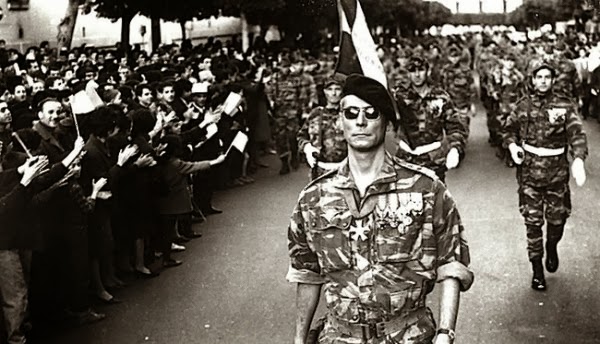We’ve come a long way as a society, but we haven't outgrown violent conflict. Wars and threats of military force are used frequently to settle disputes, and we can look at the recent situation in the Ukraine for a timely example. When you add that to situations in Syria, Afghanistan, Iraq, and so many other places, it’s a pretty scary time. Of course, this is hardly a new circumstance. It will take quite a leap for us to reach Star Trek territory and work together to further mankind. War films often make for interesting cinema, particularly when they stray from the obvious drama. When done well, they can provide a gripping take on the bleakest situations from our history. One of the most acclaimed examples is Gillo Pontecorvo’s The Battle of Algiers, which arrived a short time after the struggle between Algerian guerrillas and the occupying French forces. Released in 1966, it documents that eight-year fight that began in 1954 and resulted in Algerian independence eight years later.
One of the main reasons for this Blind Spots Series is to strong arm me into checking out movies I’d avoided for a long time. On the surface, a presentation of the Algerian conflict with mostly non-professional actors and limited dialogue sounds like a challenging viewing. Once again, my one-dimensional assumptions were proven wrong by this riveting film. The story is based on the book Souvenirs de la Bataille d'Alge by Saadi Yacef, who was a leader of the National Liberation Front (FLN) that opposed the French government. He appears in this picture in a similar role, and we receive an insider’s look at the workings of those fighters. Even so, it’s hardly a one-sided take on these events. The FLN uses brutal tactics that have little concern for innocent victims within the slaughter. Both sides keep escalating what they’ll do, and this unfortunate cycle only leads to more destruction.
A remarkable sequence takes us step by step through the preparations by three women for bombing attacks in public areas. We observe them building disguises, receiving instructions, and venturing into crowded areas to unleash death against the French. The tense scenes include few words yet say plenty about what’s going to happen. The attackers sit in a crowded establishment and observe women and children among the innocents that are minutes from their end. It’s a stunning look at how far the conflict has escalated following a bombing from the soldiers that killed Algerian families. The suspense recalls a lengthy scene from Hitchcock’s Sabotage with a bomb set to go off at any minute. Both examples don’t overdo the intensity, and Pontecorvo’s languid pace makes it even more effective.
The first hour focuses on the FLN as they step up and start removing their oppressors. They function like the heroes of a patriotic film like Red Dawn or The Patriot, yet they’re committing murder. This film gives us a chance to understand why they act without endorsing it as the right solution. The narrative shift comes with the arrival of Colonel Mathieu (Jean Martin), a determined military man determined to squash the rebellion. He lives by a code of honor but won’t allow chaos to continue in the streets. Mathieu’s systematic approach to taking out the FLN changes the tide. Even so, there’s only so much anyone can do when the people demand change. The images of crowds hitting the streets to gain their independence feel similar to the recent documentary The Square about Egypt. All of this has happened before, and it will happen again. The cycle of war and upheaval is harder to understand here in the States, but it’s a common trend around the world. This story gives insight into the challenges facing any nation under foreign rule.
The Battle of Algiers received notoriety in 2003 when it was screened at the Pentagon for input on the conflict in Iraq. It’s interesting because Pontecorvo avoids making stark political statements about the reasons for the war. We learn that the French use torture and other violent methods to maintain control, and it’s clear that the Italian filmmaker has sympathies with the Algerian people. Even so, there are enough complexities to allow for diverse interpretations of the events. Anti-war viewers may find both sides at fault for using such ruthless methods. The rebels ultimately achieve victory and gain independence, but it happens years after the shutdown of their revolution. This raises questions about whether that battle really drove the push for independence in the long run. It’s these layers that make this film one of the most essential depictions of war in movie history.



This was certainly one of the most gripping films that I had ever seen and certainly one of the scariest. That scene where the Algerians drop a bomb in a cafe is really shocking. You know what will happen but that sense of timing and suspense makes you wait for what is inevitable and it hits you very hard. It's a truly genius film.
ReplyDeleteThat cafe scene is something else. It moves so slowly and just keeps building up the suspense about what will happen. The whole film is so precisely put together and throws us right into the action. I did not expect to be so engrossed in it. We're definitely on the same page.
Delete